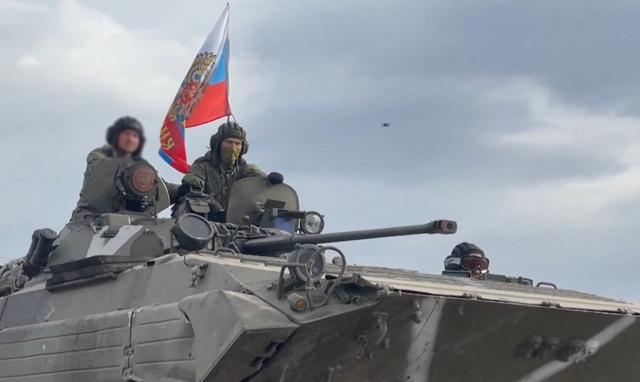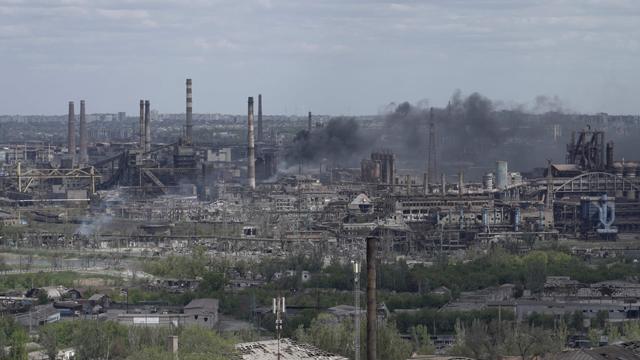You are here
War in Kyiv, Ukraine refuses to surrender Mariupol
By AFP - Mar 21,2022 - Last updated at Mar 21,2022
KYIV — Ukraine rejected a Russian ultimatum to surrender the besieged port city of Mariupol on Monday, as overnight Russian strikes destroyed a shopping mall in the capital Kyiv, killing eight people.
Almost 350,000 people are trapped without water and electricity in the southern city of Mariupol, which has been bombarded by Russian troops for almost a month in what EU foreign policy chief Josep Borrell described as a "massive war crime".
Elsewhere in Ukraine, Russian bombs struck targets overnight, allegedly damaging a chemical plant in the north of the country causing an "ammonia leakage".
Nearly a month after Russia launched its full-scale invasion on February 24, troops pressed on despite sweeping unprecedented sanctions imposed by Western allies.
Russian strikes, likely a missile, laid waste to a shopping mall in Kyiv, whose mayor announced a new curfew from 8:00 pm (18:00 GMT) on Monday until 7:00 am (05:00 GMT) on Wednesday.
AFP reporters saw six bodies covered by black sheets laid out on the ground at the complex called “Retroville”.
“My apartment shook with the force of the explosion, I thought the building would collapse,” said Vladmir, 76, who lives nearby.
“It’s the biggest bomb to have hit the city until now,” said Dima Stepanienko, 30. He found himself flung to “the foot of his bed” by the explosion, he added.
An Orthodox priest walking through the wreckage muttered prayers while cursing “Russian terrorists”.
Ukraine’s President Volodymyr Zelensky urged Europe to significantly dial up pressure on Moscow to halt its invasion, saying the continent must cease all trade with Russia.
‘Completely destroyed’
“No euros for the occupiers. Close all of your ports to them. Don’t export them your goods. Deny energy resources. Push for Russia to leave Ukraine,” Zelensky said in his latest video address.
Ukrainian leaders also stressed they were standing firm against invaders in Mariupol, which is suffering a critical humanitarian crisis.
Defenders of the port city have “played a huge role in destroying the enemy’s plans and enhancing our defence”, said Ukraine’s Defence Minister Oleksiy Reznikov.
“Today Mariupol is saving Kyiv, Dnipro and Odessa. Everyone must understand this.”
The Kremlin’s military command had warned authorities in Mariupol had until “5am... on March 21” to respond to eight pages of demands, which Ukrainian officials said would amount to a capitulation.
Rejecting the ultimatum by Russia, Ukraine’s Deputy Prime Minister Iryna Vereshchuk said Moscow should instead allow the trapped residents to escape.
Mariupol is a pivotal target in Vladimir Putin’s war in Ukraine — providing a land bridge between Russian forces in Crimea to the southwest and Russian-controlled territory to the north and east.
A Greek diplomat, believed to be the last EU diplomat to leave the city, said the devastation would rank alongside history’s most ruinous wartime assaults.
“Mariupol will be included in a list of cities in the world that were completely destroyed by the war, such as Guernica, Stalingrad, Grozny, Aleppo,” said Manolis Androulakis, as he arrived back in Athens late Sunday.
Oil prices surge
In the north, Ukrainians were told to temporarily take shelter after an ammonia leak at a nearby chemical factory, before an all-clear was sounded mid-morning.
At the port city of Odessa, known as the pearl of the Black Sea, shelling by Russian warships damaged several houses. No casualties were reported, an official in the Ukrainian city said.
Away from the frontlines, leaders of the United States, Britain, France, Germany and Italy were once again in urgent talks on the war.
Separately, foreign ministers of the European Union were gathered in Brussels to mull fresh sanctions against Russia.
Some members within the bloc are pushing for a complete embargo on Russian oil and gas, but Germany has so far rejected the call, warning it could spark social instability.
The Kremlin on Monday heaped on the warnings against such a ban.
“Such an embargo will have a very serious impact on the world energy market, it will have a very serious negative impact on Europe’s energy balance,” said spokesman Dmitry Peskov.
World oil prices, already sky-high over the Ukraine conflict, on Monday surged again as top producer Saudi Arabia warned that attacks by Yemeni rebels on the kingdom’s oil facilities posed a “direct threat” to global supplies.
Energy prices and supply security issues will be on the table at an EU summit on Thursday in Brussels, to be attended by President Joe Biden.
The US leader will also join in a NATO summit and G-7 talks, before travelling on Friday to Poland, which has seen more than two million Ukrainians cross its border to flee the war.
Moscow furiously hit out against Biden after he branded Putin a “war criminal”.
Spectre of famine
“Such statements by the American president, which are not worthy of a high-ranking statesman, have put Russian-American relations on the verge of rupture,” the foreign ministry said.
Kyiv meanwhile turned to another major world power, China, urging it to “play an important role in” ending the conflict.
Humanitarian conditions continued to deteriorate in the mostly Russian-speaking south and east, where Russian forces have been pressing their advance, as well as in the north around Kyiv.
Aid agencies are struggling to reach people trapped in besieged cities.
Around 10 million Ukrainians have fled their homes, roughly one-third going abroad, the UN refugee agency said.
The repercussions of the war are spreading far beyond the region, with famine feared in parts of the world because Russia and Ukraine are both major agricultural exporters.
“Sudan is in a particularly vulnerable position because 86-87 per cent of its wheat imports is coming from Russia and Ukraine combined,” warned David Wright, chief operating officer at charity Save the Children.
Signs of strain are also appearing in Russia, where scenes of panic buying at supermarkets prompted authorities to urge the public not to stockpile.
“I want to calm our citizens: We are fully self-sufficient when it comes to sugar and buckwheat,” Deputy Prime Minister Viktoria Abramchenko.
“Panic-buying only de-stabilises the distribution network,” she said.
Related Articles
ZAPORIZHZHIA, Ukraine — Hopes for a weekend truce in Ukraine to celebrate the Orthodox Easter faded with talks between Moscow and Kyiv stall
KYIV — Two "super powerful bombs" rocked Mariupol on Tuesday as Ukrainian authorities made a fresh attempt at rescuing civilians from the be
KYIV, Ukraine — The United States warned on Tuesday that Russian President Vladimir Putin was ready for a long war in Ukraine and will not s



















